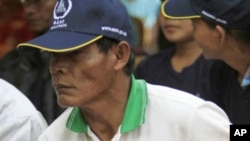Officials from the Khmer Rouge tribunal are in the former communist stronghold of Anlong Veng, Oddar Meanchey province, this week to assure former lower cadre they will not be prosecuted by the UN-backed court.
The court has so far arrested five leaders of the regime and prosecuted only one. Three are currently on trial for atrocity crimes, and two more cases are before the court that would require more indictments.
However, court officials told about 200 people in Anglong Veng Thursday this did not mean the arrests of the rank-and-file Khmer Rouge. The gathering took place at the former home of Ta Mok, an infamous Khmer Rouge leader known as the Butcher. His home has become a tourist destination since his death in July 2006.
Sann Roeun, 60, a resident of Anlong Veng who joined the Khmer Rouge in 1972, said he feared the trial process would continue beyond the top leaders currently on trial—Nuon Chea, Khieu Samphan and Ieng Sary. He said the court should consider their qualities, “their love of the nation in protecting the country,” as their trial for atrocity crimes moves forward.
“How many more cases?” asked another attendant of the forum.
Seng Bun Kheang, a deputy prosecutor for the court, tried to allay such concerns. “All of you who are only family members, or brothers or sisters, or were only under orders are not under the jurisdiction of the ECCC,” he said, referring to the tribunal by its formal acronym. “You are not to be worried about.”
Tribunal spokesman Lars Olsen told the gathering that there would be no more new cases beyond those already before the court.
That could mean cases 003 and 004, which would require five more indictments. Many court observers, however, doubt the two cases, strongly opposed by senior members of the current government, will go forward. Prime Minister Hun Sen has said more arrests could destabilize the country by causing concern among former Khmer Rouge such as those gathered in Anlong Veng. These former Khmer Rouge signed a peace deal with the government in 1998, ending years of conflict.
“Please don’t worry about charges or arrests,” said Leang Soda, deputy governor of Oddar Meanchey, which lies amid the jungle Dangrek Mountains. “The reconciliation policy is still in force.”




